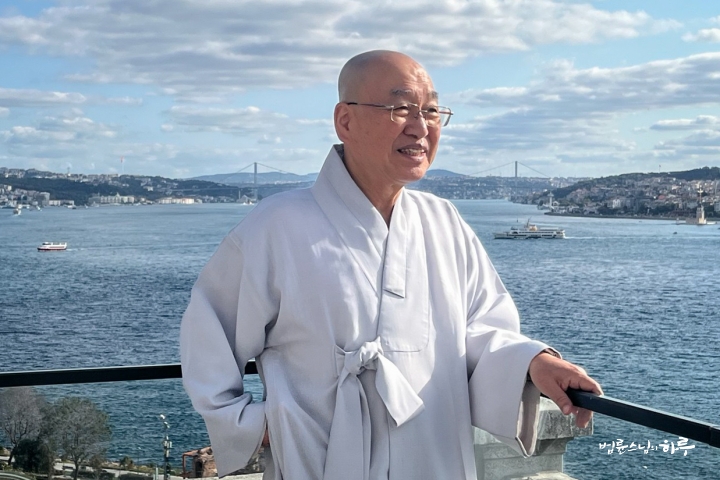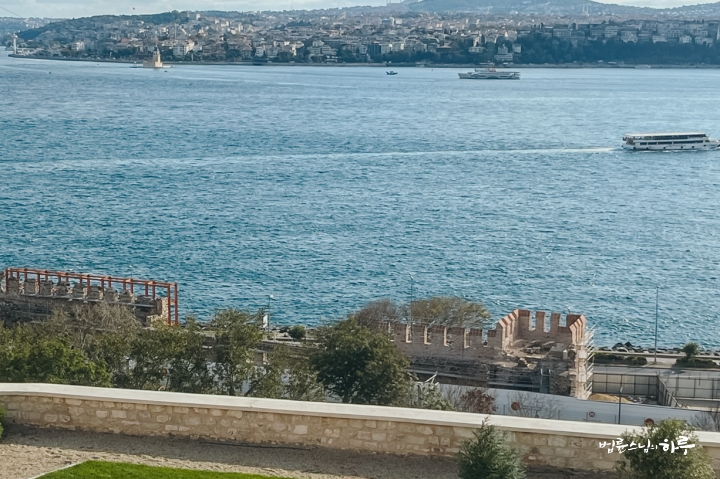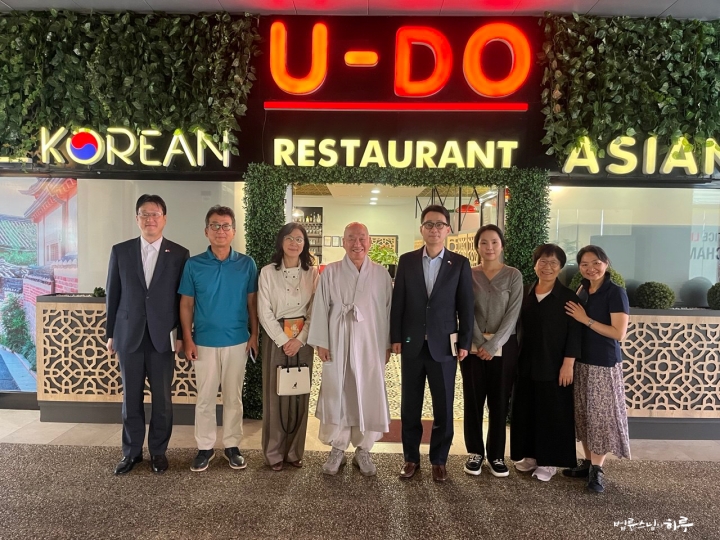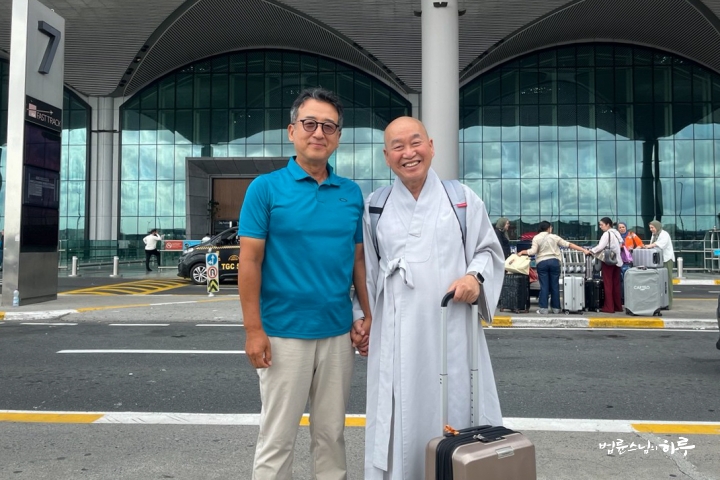September 15, 2025. Istanbul
Hello. Today, Sunim spent his last day in Istanbul, visiting Topkapi Palace before traveling to Bangkok.
Sunim woke up at 5 a.m. and began the day with prayer and meditation. After breakfast, at 8:40 a.m., he walked to the Topkapi Palace Museum, just a 5-minute walk away.
Topkapi Palace was where the sultans of the Ottoman Empire resided and ruled the empire for over 400 years. Inside the palace, the sultan’s chambers, meeting rooms, kitchens, harem, and Islamic relics were well preserved. However, that glorious history now remains only as exhibited artifacts.
Outside the palace, there was an observation deck with views of both the sea and the fortress walls. Beyond the coastal walls built centuries ago, the Bosphorus Strait stretched out.

After touring the palace, at noon, Sunim had lunch with Mr. Lee Woo-sung, Consul General of Istanbul, and Mr. Kim Young-hoon, former president of the Korean Association. After the meal, they departed for the airport at 1:30 p.m.
Upon arriving at the airport, Sunim expressed his gratitude to Mr. Kim Young-hoon, former president of the Korean Association, who had provided driving services and helped with lecture preparations over the past two days.
Sunim also expressed his gratitude to Ms. Choo Hee-sook, the Europe Group Facilitator of the International Division who oversaw the European lecture tour and accompanied him from London to Istanbul, and to Dharma Teacher Myodeok.
“Thank you for all your hard work.”
After saying goodbye, Sunim entered the airport, completed departure procedures, and boarded the flight to Bangkok. The plane departed Istanbul Airport at 4:30 p.m. and after a 9-hour flight, will arrive at Bangkok Airport at 5:30 a.m. local time tomorrow.
Tomorrow morning, Sunim will meet JTS President Park Gina and INEB’s Anchalee at Bangkok Airport, then take another flight in the afternoon to Mandalay, Myanmar, to begin a survey trip for earthquake relief activities.
Since there was no Dharma talk today, I’ll conclude by sharing a dialogue between a questioner and Sunim from yesterday’s Dharma Q&A with Korean expatriates in Istanbul.
I am Afraid My Choice Could Ruin Child’s Life
“Looking at the surface phenomenon, it appears that you have difficulty making choices, but fundamentally, you are avoiding responsibility for your choices. Choice is the realm of freedom, and freedom always comes with responsibility. In other words, if there is a cause, there must be a result, and choices come with the responsibility of accepting their consequences.
For example, if you borrow money, you have the responsibility to pay it back with interest. If after borrowing money you regret having to pay it back with interest, then next time, don’t borrow. This is learning. Once you’ve learned, even if a similar situation arises, you won’t borrow even if it’s a bit difficult. In other words, if you’ve created a cause, accept the result; if you don’t like the result, don’t create the cause.
When people think about practice, they only think about not creating causes when bad results are expected. However, accepting results willingly when you’ve created causes is also practice. If you understand this, there is no good or bad in choices. Any choice is fine. But when you say it’s a bad choice, it means you regret it, and regret means not accepting the result.”
“If choices were about my own things, I could make them freely, but raising children makes me constantly think about ‘what would be good for these children.’ It’s not something I have to bear, but something the child will have to bear later. So I think I can’t make choices well because I feel I need to make good choices for my child.”
“Life is about doing your best with your current abilities. Trying to substitute for abilities you don’t have is greed. Because of greed, people go to fortune-tellers and invite misfortune upon themselves. Who can accurately know about the society 20 years from now when this child will be living? If we could accurately predict 20 years ahead, we could say which path is best. But none of us can easily predict 20 years from now. So your attempt to choose on behalf of your child is itself greed. Going to fortune-tellers is the same.
Looking at artificial intelligence technology, fixed logic, techniques, and knowledge can be replaced by AI. The foundation of AI is calculation. Like ‘1 plus 1 equals 2,’ fixed logic is developed first, and then massive amounts of data are accumulated on that foundation. Since people’s personalities and habits are repetitive, prediction and response are possible if sufficient data is collected. That’s why data is now the greatest asset. While land and capital were important in the past, data is important now precisely because of its predictive and responsive capabilities. For this reason, democratic societies restrict the indiscriminate collection and use of data, but China collects data randomly at the state level, and with its large population, it can secure abundant data. This is why China has a high possibility of leading in the AI field.
Fields with established rules like law or medicine can be replaced by AI. However, manual labor fields that are unpredictable and undefined are difficult to replace. The problem is that we cannot predict at what speed these changes will occur. In the Joseon Dynasty, the main industry was agriculture, and the path to success was the civil service examination system. People studied at seodang (village schools) or seowon (private academies) to take the civil service exams. However, when modern education entered Korea in the late Joseon period, elementary schools were established, but they were mainly run by missionaries, so commoners attended while the yangban (nobility) did not. Yangban children continued studying at seodang preparing for civil service exams and failed to respond to social changes. While a small minority quickly accepted modernization and benefited, the majority of the ruling class couldn’t adapt to social changes and declined, leading to a shift in social classes.
The labor needed in industrial society is not simple labor, but technical and knowledge-based labor that increases efficiency. Modern school education teaches these techniques and knowledge. Only a very small number of schools pursue pure academics; most aim to secure a workforce with the knowledge and skills needed by industrial society. However, if AI replaces knowledge and technical labor, the school system and how we evaluate human talent will also change. But we have no experience with this. Even if parents guide their children based on their own experiences, we don’t know if what parents teach now will be useful when children enter society.
The big problem with current school education is that educational administrators, teachers, and parents—all people who don’t know about future changes—are gathering to research new education. Since people who don’t know are making proposals, even though they call it innovative education and work hard, the innovation effect isn’t significant. Failures and trial-and-error are bound to repeat. So we shouldn’t think of mothers who line up their children by grades as wise anymore. In an era of rapid change like now, the most important ability is not grades but adaptability. If farming is needed, learn farming; if welding is needed, learn welding; if computer skills are required, quickly acquire them too. The ability to actively respond to the changes of the times—that is the most valuable ability today.
Currently, schools only teach one specialized skill, so if there are no jobs in that field, the knowledge learned becomes useless. It’s the same with what monks learn in temples. They learn to strike the moktak, chant, conduct ceremonies, and give blessings in temples, but if they leave the monkhood, there’s nowhere to use these skills. The current education system is similar—if graduates can’t utilize their college major in society, most look for other work unrelated to their major after graduation. Even specialized fields requiring licenses are being rapidly replaced by AI, so many people fear losing their jobs. No one can easily predict what jobs will be mainstream 20 years from now.
For children to actively respond to changes, training methods must change. Attending school 100 percent and getting good grades isn’t that important. When talking with children, rather than giving them the right answers, it’s better to make them think about problems and listen to each person’s opinion. Teachers should guide children by saying things like ‘That makes sense too,’ or ‘You could think of it that way.’ Teaching children by saying ‘That’s wrong’ or ‘That’s right’ is imitation education. Education with fixed answers like right and wrong is imitation education. For the past 100 years, we’ve learned right and wrong by imitating the West. Creative education has no fixed answers. Samsung has the best technology, but it’s just cutting-edge technology from imitation. That’s why crisis comes. When you’re second, you just follow, but now somehow we’re standing at the front. Currently, we’re at a point where we need to create everything anew, but the education system isn’t responding to this.
Even if you create a program to educate your child creatively, will the child really become creative? In fact, the child will imitate what the mother has planned under the name of creativity. Creativity is similar to wildness. It requires a process of repeated trial and error, self-realization, and awareness. In this sense, creativity resembles Buddhist practice. Seon Buddhism denies fixed ideas and always raises questions. Rather than unconditionally accepting that God created the world, it questions everything and keeps open the possibility of thinking anew. These Buddhist teachings can help with creative education.
While teaching children basic order and discipline, for other matters like ideology or study, you should first listen to and respect their thoughts. And if there are contradictions in their thinking, point them out through conversation. If they say they want to go to a good university but don’t study, that’s a contradiction. You should point out such contradictions, not just say they must go to a good university. When a child sets goals and there are contradictions in the studying process, you should say, ‘If you don’t want to study, you don’t have to. But then you shouldn’t think about going to university.’ It’s good to start training at home to take responsibility for one’s choices. You’re not a futurist. Simply put, it’s best if you just cook meals and do laundry, and leave the rest to the child or the school teachers. If the child asks, it’s enough to answer, ‘The world is changing so fast these days that mom doesn’t know either, so think about it yourself.’ Prescribing ‘You should do this, you should do that’ is definitely not a good approach.
If I have some creativity, it’s thanks to my parents. My mother and father were uneducated. They never nagged about studying. Other than worrying about my health and providing meals, they didn’t offer other help. I decided whether to go to middle school and where to go by discussing with seniors and friends. Because my parents didn’t know much, I could try various things and manage on my own from a young age. If parents had graduated from university, taken responsibility for all choices, and even managed marriage, how could children be creative, independent, and autonomous? No matter how much we tell young people to be creative and autonomous, it has little effect. After raising them like puppies in a cage and suddenly telling them to be autonomous, children rebel. At such times, I think the children have a point, so I say ‘That makes sense’ and continue the conversation.
You don’t need to worry too much about raising children well. I always tell mothers to raise their children loosely. Feed them, don’t scold them unnecessarily, and only establish order when they go seriously astray. Scolding when they’re young can cause psychological suppression. If you do everything the child asks for, they’ll become spoiled. If they ask to be sent abroad to study and you can afford it, send them; if you can’t afford it, say ‘Studying abroad is good, but mom doesn’t have money.’ Don’t scold them saying ‘How can our family afford studying abroad?’ Instead say, ‘It’s good that you want to study abroad, but we can’t afford it. What can we do? If you can do it yourself, try.’ Even if the child says, ‘You can’t even do that? Then why did you have me?’ you can respond, ‘I didn’t plan to have you either. But you were born, what could I do? I had to raise you.’ Don’t respond too meticulously; just respond lightly with a smile.”
“Thank you, Sunim.”





